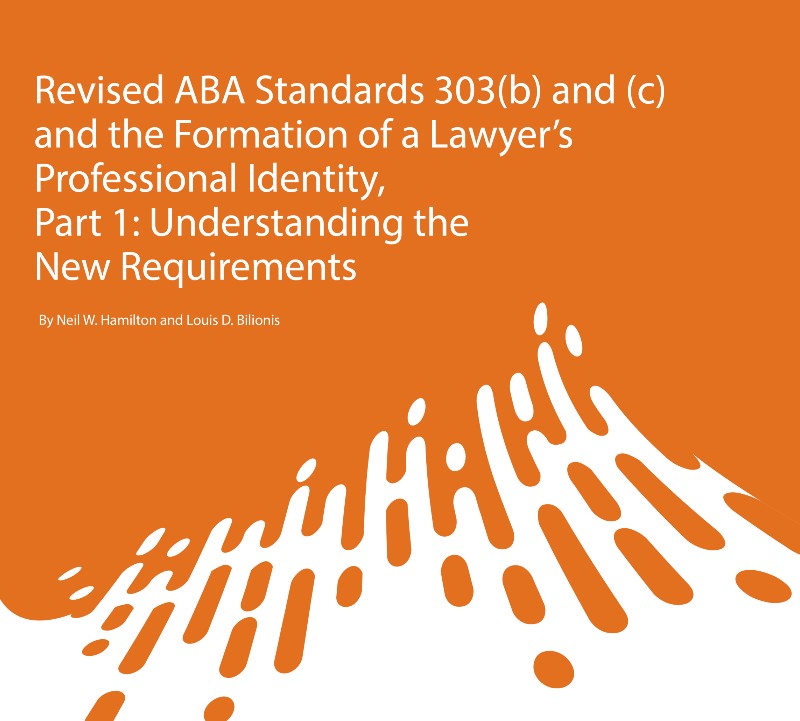By: Neil Hamilton, Holloran Professor of Law and Co-Director of the Holloran Center for Ethical Leadership in the Professions, University of St. Thomas School of Law
The Standard 303 revisions require each law school, over time, to move toward a developmental sequence of modules fostering student reflection and growth regarding professional identity.
- New Standard 303(b)(3) requires that “a law school shall provide substantial opportunities to students for the development of a professional identity.” (emphasis added regarding the developmental nature of professional identity and the number of opportunities).
- New Interpretation 303-5 defines professional identity. “Professional identity focuses on what it means to be a lawyer and the special obligations lawyers have to their clients and society. The development of a professional identity should involve an intentional exploration of the values, guiding principles, and well-being practices considered foundational to successful legal practice.” (emphasis added regarding the developmental nature of professional identity).
- New Interpretation 303-5 continues, “Because developing a professional identity requires reflection and growth over time, students should have frequent opportunities for such development during each year of law school and in a variety of courses and co-curricular and professional development” (emphasis added regarding the developmental nature of professional identity and the number of opportunities).
The Standard 303 revisions clearly require each law school to create a developmental sequence of opportunities for reflection and growth over time so that each student explores and internalizes the values, guiding principles, and well-being practices considered foundational to successful legal practice. This developmental sequence of opportunities to foster each student’s professional identity requires coordination and progression among the modules.
The empirical research on professional identity formation strongly supports guided reflection in one-on-one coaching (especially in the context of authentic professional experiences) as the most effective curriculum to foster this type of student growth. The one-on-one coaching engagements also provide some basis for expert observation necessary for program assessment of our professional identity learning outcomes. There is no empirical evidence that doctrinal coverage and analysis of professional identity topics without guided reflection will make any difference with respect to student development.
- New Standard 303(c) requires that a law school shall provide education on cross-cultural competency, equal access, and the elimination of bias, discrimination, and racism at the start of the program of legal education and at least once again before graduation.
- New Interpretation 303-6 states that these same values should be included in the Professional Responsibility course.
- Since the definition of “professional identity” in Interpretation 303-5 focuses on what it means to be a lawyer and the special obligations lawyers have to their clients and society, and the Interpretation also provides that professional identity development should involve an intentional exploration of the values of the profession, it seems reasonable that the values of cross-cultural competency, equal access, and the elimination of bias, discrimination, and racism should be included in the developmental sequence of opportunities for reflection and growth over time so that each student explores and internalizes them. Again, this developmental sequence of opportunities to foster each student’s professional identity requires coordination and progression among the modules.
It may be that the common committee structure for law school faculties will not be effective to foster this type of change in the curriculum. Curriculum Committees, in my experience, are responsive to proposals for individual courses, and are not generally pro-active in generating coordinated modules across the curriculum. A Curriculum Reform Task Force might contribute initially to this type of coordination, but again, my experience is that the reports of this type of task force end up in a type of “graveyard” with other past curriculum reform task force reports. The type of coordinated change envisioned here is going to take ten to twenty years – one small step at a time. I think the most effective answer is a pro-active Coordinated Standard 303 Modules Committee with membership from all the staff and faculty functions that affect student professional identity formation.
If you have any questions or comments about this post, then please contact me at NWHAMILTON@stthomas.edu.

Neil Hamilton is the Holloran Professor of Law and Co-Director of the Holloran Center for Ethical Leadership in the Professions at the University of St. Thomas School of Law in Minnesota.



